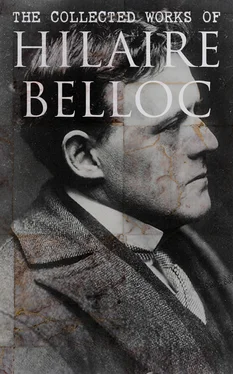This lie so annoyed me that I said angrily in French (which I made as southern as possible to suit them):
'You lie: and you can be punished for such lies, since you are an official.' For though the police are the same in all countries, and will swear black is white, and destroy men for a song, yet where there is a _droit administratif-_ that is, where the Revolution has made things tolerable--you are much surer of punishing your policeman, and he is much less able to do you a damage than in England or America; for he counts as an official and is under a more public discipline and responsibility if he exceeds his powers.
Then I added, speaking distinctly, 'I can speak French and Latin. Have you a priest in Calestano, and does he know Latin?'
This was a fine touch. They winced, and parried it by saying that the Sindaco knew French. Then they led me away to their barracks while they fetched the Sindaco, and so I was imprisoned.
But not for long. Very soon I was again following up the street, and we came to the house of the Sindaco or Mayor. There he was, an old man with white hair, God bless him, playing cards with his son and daughter. To him therefore, as understanding French, I was bidden address myself. I told him in clear and exact idiom that his policemen were fools, that his town was a rabbit-warren, and his prison the only cleanly thing in it; that half-a-dozen telegrams to places I could indicate would show where I had passed; that I was a common tourist, not even an artist (as my sketch-book showed), and that my cards gave my exact address and description.
But the Sindaco, the French-speaking Sindaco, understood me not in the least, and it seemed a wicked thing in me to expose him in his old age, so I waited till he spoke. He spoke a word common to all languages, and one he had just caught from my lips.
'Tourist-e?' he said.
I nodded. Then he told them to let me go. It was as simple as that; and to this day, I suppose, he passes for a very bilingual Mayor. He did me a service, and I am willing to believe that in his youth he smacked his lips over the subtle flavour of Voltaire, but I fear to-day he would have a poor time with Anatole France.
What a contrast was there between the hour when I had gone out of the cafe a prisoner and that when I returned rejoicing with a crowd about me, proclaiming my innocence, and shouting one to another that I was a tourist and had seventy-three lira on my person! The landlady smiled and bowed: she had before refused me a bed! The men at the tables made me a god! Nor did I think them worse for this. Why should I? A man unknown, unkempt, unshaven, in tatters, covered with weeks of travel and mud, and in a suit that originally cost not ten shillings; having slept in leaves and ferns, and forest places, crosses a river at dusk and enters a town furtively, not by the road. He is a foreigner; he carries a great club. Is it not much wiser to arrest such a man? Why yes, evidently. And when you have arrested him, can you do more than let him go without proof, on his own word? Hardly!
Thus I loved the people of Calestano, especially for this strange adventure they had given me; and next day, having slept in a human room, I went at sunrise up the mountain sides beyond and above their town, and so climbed by a long cleft the _second_ spur of the Apennines: the spur that separated me from the _third_ river, the Parma. And my goal above the Parma (when I should have crossed it) was a place marked in the map 'Tizzano'. To climb this second spur, to reach and cross the Parma in the vale below, to find Tizzano, I left Calestano on that fragrant morning; and having passed and drawn a little hamlet called Frangi, standing on a crag, I went on up the steep vale and soon reached the top of the ridge, which here dips a little and allows a path to cross over to the southern side.
It is the custom of many, when they get over a ridge, to begin singing. Nor did I fail, early as was the hour, to sing in passing this the second of my Apennine summits. I sang easily with an open throat everything that I could remember in praise of joy; and I did not spare the choruses of my songs, being even at pains to imitate (when they were double) the various voices of either part.
Now, so much of the Englishman was in me that, coming round a corner of rock from which one first sees Beduzzo hanging on its ledge (as you know), and finding round this corner a peasant sitting at his ease, I was ashamed. For I did not like to be overheard singing fantastic songs. But he, used to singing as a solitary pastime, greeted me, and we walked along together, pointing out to each other the glories of the world before us and exulting in the morning. It was his business to show me things and their names: the great Mountain of the Pilgrimage to the South, the strange rock of Castel-Nuovo; in the far haze the plain of Parma; and Tizzano on its high hill, the ridge straight before me. He also would tell me the name in Italian of the things to hand--my boots, my staff, my hat; and I told him their names in French, all of which he was eager to learn.
We talked of the way people here tilled and owned ground, of the dangers in the hills, and of the happiness of lonely men. But if you ask how we understood each other, I will explain the matter to you.
In Italy, in the Apennines of the north, there seem to be three strata of language. In the valleys the Italian was pure, resonant, and foreign to me. There dwell the townsmen, and they deal down river with the plains. Half-way up (as at Frangi, at Beduzzo, at Tizzano) I began to understand them. They have the nasal 'n'; they clip their words. On the summits, at last, they speak like northerners, and I was easily understood, for they said not _'vino' _but _'vin';_ not _'duo'_ but _'du'_, and so forth. They are the Gauls of the hills. I told them so, and they were very pleased.
Then I and my peasant parted, but as one should never leave a man without giving him something to show by way of token on the Day of Judgement, I gave this man a little picture of Milan, and bade him keep it for my sake.
So he went his way, and I mine, and the last thing he said to me was about a _'molinar'_, but I did not know what that meant.
When I had taken a cut down the mountain, and discovered a highroad at the bottom, I saw that the river before me needed fording, like all the rest; and as my map showed me there was no bridge for many miles down, I cast about to cross directly, if possible on some man's shoulders.
I met an old woman with a heap of grass on her back; I pointed to the river, and said (in Lingua Franca) that I wished to cross. She again used that word _'molinar',_ and I had an inkling that it meant 'miller'. I said to myself--
'Where there is a miller there is a mill. For _Ubi Petrus ibi Ecclesia._ Where there is a mill there is water; a mill must have motive power: .'. (a) I must get near the stream; (b) I must look out for the noise and aspect of a mill.
I therefore (thanking the grass-bearing woman) went right over the fields till I saw a great, slow mill-wheel against a house, and a sad man standing looking at it as though it were the Procession of God's Providence. He was thinking of many things. I tapped him on the shoulder (whereat he started) and spoke the great word of that valley, _'molinar'_. It opened all the gates of his soul. He smiled at me like a man grown young again, and, beckoning me to follow, led radiantly up the sluice to where it drew from the river.
Here three men were at work digging a better entry for the water. One was an old, happy man in spectacles, the second a young man with stilts in his hands, the third was very tall and narrow; his face was sad, and he was of the kind that endure all things and conquer. I said '_Molinar_? I had found him.
To the man who had brought me I gave 50 c., and so innocent and good are these people that he said _'Pourquoi?'_ or words like it, and I said it was necessary. Then I said to the molinar, _'Quanta?'_ and he, holding up a tall finger, said '_Una Lira'._ The young man leapt on to his stilts, the molinar stooped down and I got upon his shoulders, and we all attempted the many streams of the river Parma, in which I think I should by myself have drowned.
Читать дальше












